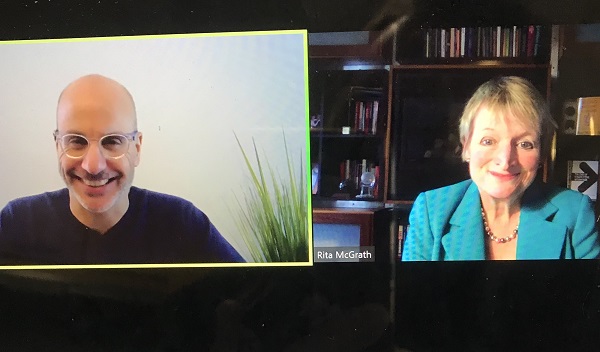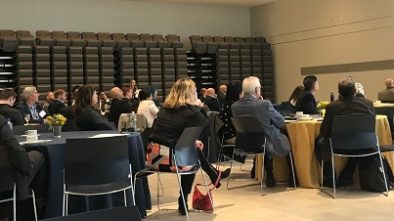In Times of High Uncertainty, Innovation is the Way Out, McGrath Tells Barrood in Virtual Chat
A renowned Columbia Business School professor said that the coronavirus pandemic has triggered indecision and economic uncertainty, but that the savviest innovators are finding ways to make a difference to society during this time.
High-end vacuum giant Dyson, whose headquarters are in the UK, as well as Timberlane, a shutter maker based in Montgomeryville, Pennsylvania, are among the companies that are rapidly changing what they make. They’re now cranking out products that are desperately needed, such as ventilators and personal protective equipment for hospitals.
“We know that in high-uncertainty situations innovation is the only way you’re going to get to any kind of answer,” said Rita McGrath, one of the world’s top experts on strategy and innovation.
McGrath made her remarks during a recent Zoom discussion with James Barrood, an adviser to Tech Council Ventures and Jumpstart NJ Angel Network, about her latest book, “Seeing Around Corners: How to Spot Inflection Points in Business Before They Happen.”
McGrath directs the Leading Strategic Growth and Change program at Columbia Business School. She is known for her work on entrepreneurship, strategy and innovation, especially during times of uncertainty.
High Uncertainty
“We’ve always lived in a world of what I call ‘high assumptions relative to knowledge,’ so what’s happened now, if you think about your portfolio of activities, things you used to call your core business, very predictable business, it’s moved into high uncertainty. It’s fascinating that the tools that those in the innovation community used all the time are now going to be relevant to a much larger swath of the economy,” she said.
“What we have to do is adopt some of the tools in innovation, specifically tools around rapid learning, defining a small hypothesis and taking a test, and the next hypothesis, and what it looks like relative to what we do next.”
The pandemic is forcing businesses to reevaluate their operations and to stay relevant while keeping an eye on strategic inflection points, “which happen in the environment that causes your assumptions about your business to become less representative of reality,” said McGrath.
“At Columbia Business School, we have piles of assumptions on how the business school model works. Those are all being challenged, and we don’t know what the future model of business will be. That is an example of how you were making assumptions that are now being invalidated,” she added.
“Columbia is not alone. If we’re being honest, everybody says, ‘I don’t know.’
Turning Away From “Innovation Theater”
“I think what you will see is a turning away from what I call ‘innovation theater.’ In the last two to three years, everybody had to have a corporate incubator and accelerator, and everybody was doing boot camps without really touching on the core activities of the business,” she said.
“What you are going to see now is a lot more serious, much higher-on-the-agenda view of innovation as it relates to your entire business agenda,” she said. “You have no choice but to try something new and different.”
One who did was James Dyson, the bagless vacuum cleaner king. In 2015 he went into the electric car business. That project ran out of gas (so to speak) four years later, leaving behind a factory equipped for building, she said.
Enter COVID-19 and a request for help from British Prime Minister Boris Johnson. Within 10 days, the billionaire inventor’s company designed a new ventilator, and began to mass produce it to help hospitals fight the virus, she said.
Meanwhile, in Pennsylvania, Timberlane was facing a collapse in demand, but it also turned to innovation. “Rick Skidmore, their founder and CEO, realized he had the same capabilities they needed to make shutters as they did to make personal protective equipment for hospital workers. They were employing 60 workers, but now have 250 employees because there was such a demand for that equipment,” she said.
“History teaches us that those who pursue innovation, who keep their workforce and capabilities intact and are prepared to invest, tend to be the ones who rocket right out of it when things begin to improve.”
The video of the chat between Barrood and McGrath can be found here.




